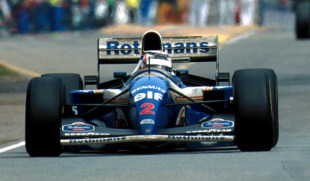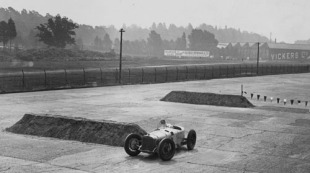
I thought that Nigel Mansell's F1 career finished with his world championship in 1992, but I spotted that he won a race later than that - what happened there? asked Terry Bull from Worcester
Nigel Mansell had a few races for Williams in 1994 when his commitments in Indycars in America allowed. He replaced David Coulthard for the French GP, but retired, then contested the last three races as Williams attempted to clinch the constructors' championship. Going into the last round, in Adelaide, both the drivers' and constructors' titles were undecided. This was the famous race in which Michael Schumacher, in a Benetton, collided with Damon Hill's Williams after clipping a wall: both were forced to retire, which gave Schumacher his first championship. Mansell was a fairly distant third at the time of their collision, but took advantage to win his 31st and last Grand Prix and secure the constructors' crown for Williams - a consolation for the team whose No. 1 driver, Ayrton Senna, had been killed earlier in the year. Mansell joined McLaren for the following season, but managed only two races as he had trouble fitting in their new car.
I noticed that the British driver Innes Ireland won one Grand Prix in his career - how many others have won just one? asked Martin Hurst from Mansfield
Innes Ireland - who, despite his name was a Yorkshire-born Scot - won the United States GP at Watkins Glen in 1961. It was his last race for the Lotus works outfit: soon afterwards he was dumped from the team for the following year, for reasons which have never been properly explained (although he is thought to have upset the Lotus team boss Colin Chapman by lending his car to Stirling Moss in the previous race). Ireland is one of 22 drivers who have won a solitary F1 world championship Grand Prix. The list includes three current drivers: Jarno Trulli, who won the Monaco GP in 2004; Robert Kubica, who won in Canada in 2008 (and let's hope he recovers soon to attempt a few more victories); and Heikki Kovalainen, who won the Hungarian GP in 2008. There are also nine Americans who won the Indianapolis 500 once during the years (1950-60) that it counted towards the world championship.
What happened to the "Grand Prix Masters" series for old drivers which I think Nigel Mansell won one year? asked George Robinson from Cornwall
This was a (very) short-lived series which lasted for all of three races in 2005-06. The idea was sound, pitting former F1 drivers against each other in identical cars - Deltas, based on the Reynard car which had had a lot of success in Indycar racing. However, the series didn't seem to catch the imagination, especially from the all-important TV networks which might have helped finance it. There was one race in 2005, at Kyalami in South Africa: Nigel Mansell finished first, ahead of Emerson Fittipaldi and Riccardo Patrese. The following year four races were planned, but only two took place - in Qatar, where Mansell won again, and at Silverstone, when Eddie Cheever came out on top. Three more races were scheduled for 2007, but none of them actually happened after the organisers filed for bankruptcy. But it's a nice idea - maybe someone else will try it sometime!

A race called the British Grand Prix was held at Brooklands in Surrey, the world's first purpose-built racetrack, in 1926 and 1927. The first year the race was won by a Delage car shared by Robert Senechal and Louis Wagner. That race involved 110 laps of the banked 2.61-mile circuit, and lasted about four hours - the British driver Malcolm Campbell, more famous perhaps for his land-speed record attempts in the original "Bluebird", was second about ten minutes behind. In 1927 another Frenchman, Robert Benoist, won in another Delage. Brooklands held its last races in 1939, just before the Second World War broke out, and hasn't been a full circuit since - so, since the official world championship didn't start until 1950, these particular British GPs don't count towards the F1 records.
Who has won the same country's Grand Prix most often? asked Richard Clarke from Sussex
Michael Schumacher leads the way here: he's won the French Grand Prix on eight occasions, between 1994 and 2006. He's also second on the list, too, having won both the Canadian and San Marino GPs seven times. And Schumacher also won the Belgian, European, Japanese and Spanish GPs six times each, equalling the old record set by Alain Prost, who won the Brazilian and French GPs six times, and Ayrton Senna, who won a record six races round the streets of Monaco - in 1987 and every year from 1989 to 1993.
I was just watching a re-run of the Sebring 12-Hour race of 2010, when the winners were three former F1 drivers. How often has this happened? asked Paul Stone from Hampshire
The winning car at Sebring in 2010, a Peugeot, was driven by Marc Gene, Alexander Wurz and Anthony Davidson, who contested 129 GPs between them. I don't think that the winning car there has been driven entirely by people with Grand Prix experience since 1972, when Mario Andretti and Jacky Ickx piloted a Ferrari to victory in the 12-Hour race. That was actually the fifth year running it had been won by drivers who had also raced in F1 (Andretti won two of those and Ickx another one).
If you want to ask Steven a question, use our feedback form. The most interesting questions will be answered here every other Friday. His long-running Ask Steven column on Cricinfo remains one of that site's most popular features
© ESPN Sports Media Ltd.
 If you want to ask Steven a question, use our feedback form. The most interesting questions will be answered here every other Friday. His long-running Ask Steven column on Cricinfo remains one of that site's most popular features Ask Steven features a number of experts, headed by Steven Lynch, who answer your questions across Formula One as well as a variety of other sports
If you want to ask Steven a question, use our feedback form. The most interesting questions will be answered here every other Friday. His long-running Ask Steven column on Cricinfo remains one of that site's most popular features Ask Steven features a number of experts, headed by Steven Lynch, who answer your questions across Formula One as well as a variety of other sports

